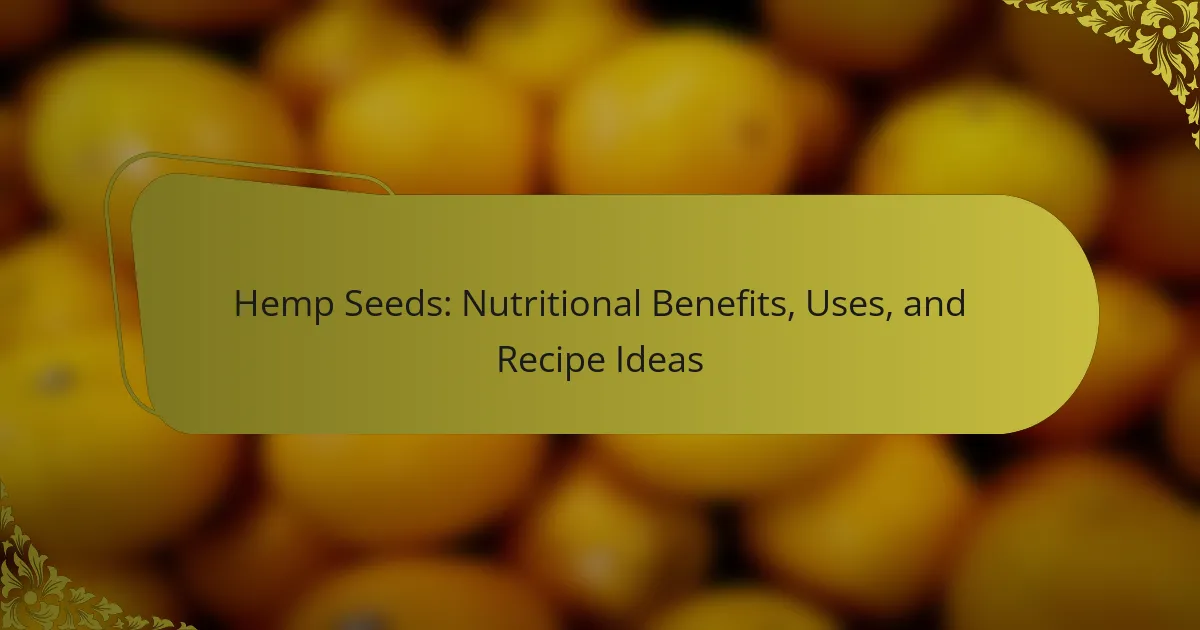Hemp seeds are a powerhouse of nutrition, offering high protein, healthy fats, and essential vitamins. They support heart health, improve skin conditions, and aid digestion. Explore their versatile uses in recipes and supplements, and discover their unique nutrient profile, including complete protein and rare gamma-linolenic acid. Learn how to store them properly to maintain freshness and maximize their benefits.
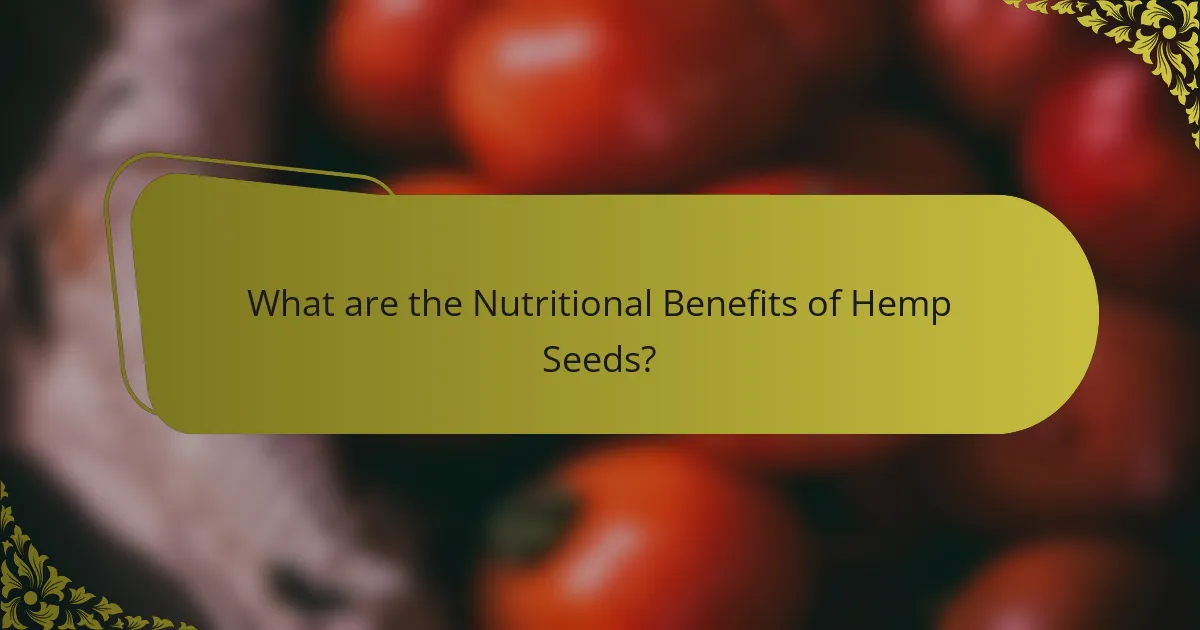
What are the Nutritional Benefits of Hemp Seeds?
Hemp seeds offer numerous nutritional benefits, including high protein content, healthy fats, and essential vitamins. They contain 25% protein, omega-3 and omega-6 fatty acids in a balanced ratio, and are rich in vitamin E and magnesium. These seeds support heart health, improve skin conditions, and aid digestion due to their fiber content. Their unique nutrient profile makes them an excellent addition to various diets, including vegan and gluten-free. Incorporating hemp seeds into smoothies, salads, or baked goods enhances both nutrition and flavour.
How Do Hemp Seeds Support Heart Health?
Hemp seeds support heart health by providing essential fatty acids, protein, and antioxidants. They are rich in omega-3 and omega-6 fatty acids, which help reduce cholesterol levels and improve cardiovascular function. The presence of arginine, an amino acid in hemp seeds, promotes nitric oxide production, enhancing blood vessel dilation. Additionally, their high fibre content aids in maintaining healthy blood pressure.
Which Vitamins and Minerals are Found in Hemp Seeds?
Hemp seeds contain a variety of vitamins and minerals essential for health. Key nutrients include vitamin E, magnesium, phosphorus, potassium, zinc, and iron. These components contribute to overall well-being and support various bodily functions.
How Do Omega Fatty Acids in Hemp Seeds Benefit the Body?
Omega fatty acids in hemp seeds support heart health, reduce inflammation, and improve brain function. They contain a balanced ratio of omega-3 and omega-6 fatty acids, which are essential for various bodily functions. For instance, alpha-linolenic acid (ALA), a type of omega-3 found in hemp seeds, contributes to cardiovascular health by lowering cholesterol levels. Additionally, gamma-linolenic acid (GLA), an omega-6 fatty acid in hemp seeds, can help alleviate symptoms of arthritis and promote skin health. Regular consumption of hemp seeds can enhance overall wellness due to these beneficial fatty acids.
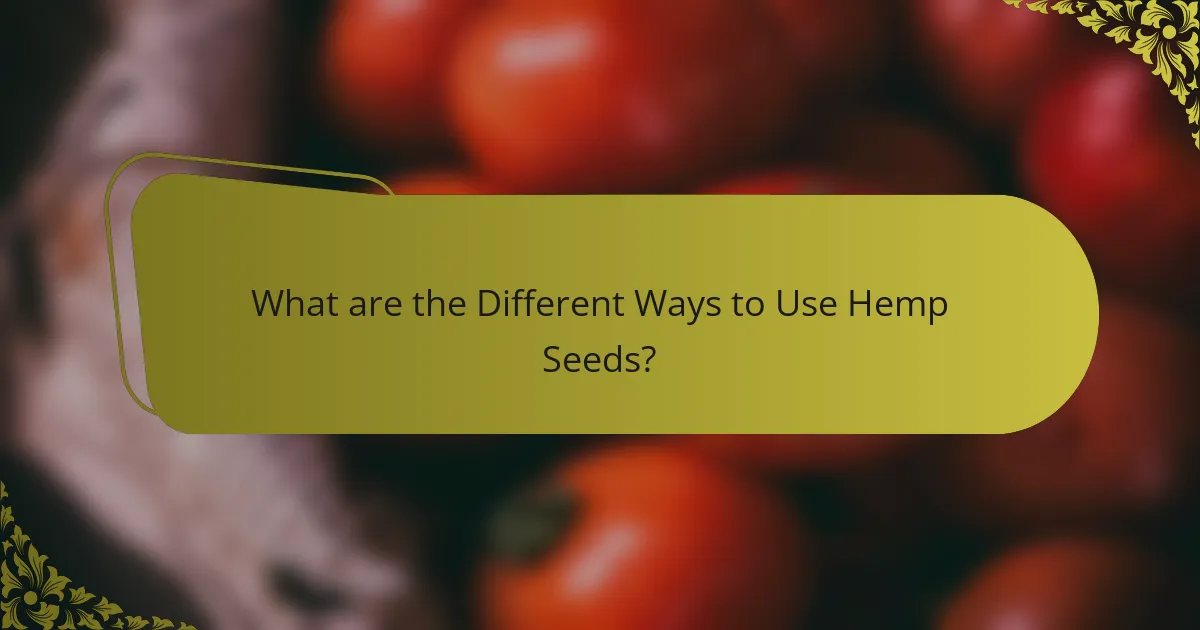
What are the Different Ways to Use Hemp Seeds?
Hemp seeds can be used in various ways, including as a food ingredient, supplement, and for skincare. They can be added to smoothies, salads, and baked goods for nutritional enhancement. Additionally, hemp seed oil can be used topically for moisturising skin. Hemp seeds are a rich source of protein, healthy fats, and essential nutrients, making them a versatile addition to any diet.
How Can Hemp Seeds Be Incorporated into Smoothies?
Hemp seeds can be easily incorporated into smoothies by adding two to three tablespoons for a protein boost. They enhance texture and provide essential fatty acids, fibre, and minerals. For a delicious combination, blend hemp seeds with fruits like bananas or berries, leafy greens, and a liquid base such as almond milk or yoghurt. This not only enriches the nutritional profile but also creates a creamy consistency.
What are Creative Ways to Add Hemp Seeds to Salads?
Hemp seeds can enhance salads with their nutty flavour and nutritional benefits. Consider these creative ways to incorporate them:
1. Sprinkle hemp seeds on top of mixed greens for added crunch.
2. Blend them into salad dressings for a creamy texture.
3. Mix hemp seeds into quinoa or grain salads for extra protein.
4. Use them in homemade salad toppings like granola or seed mixes.
5. Add them to coleslaw for a unique twist on a classic dish.
Which Baking Recipes Utilize Hemp Seeds Effectively?
Hemp seeds can be effectively used in various baking recipes, enhancing nutrition and flavour. Popular options include hemp seed bread, muffins, cookies, and granola bars. These recipes leverage hemp seeds’ high protein content and healthy fats, making them nutritious choices. Additionally, incorporating hemp seeds into baked goods can provide a unique nutty flavour and added texture.
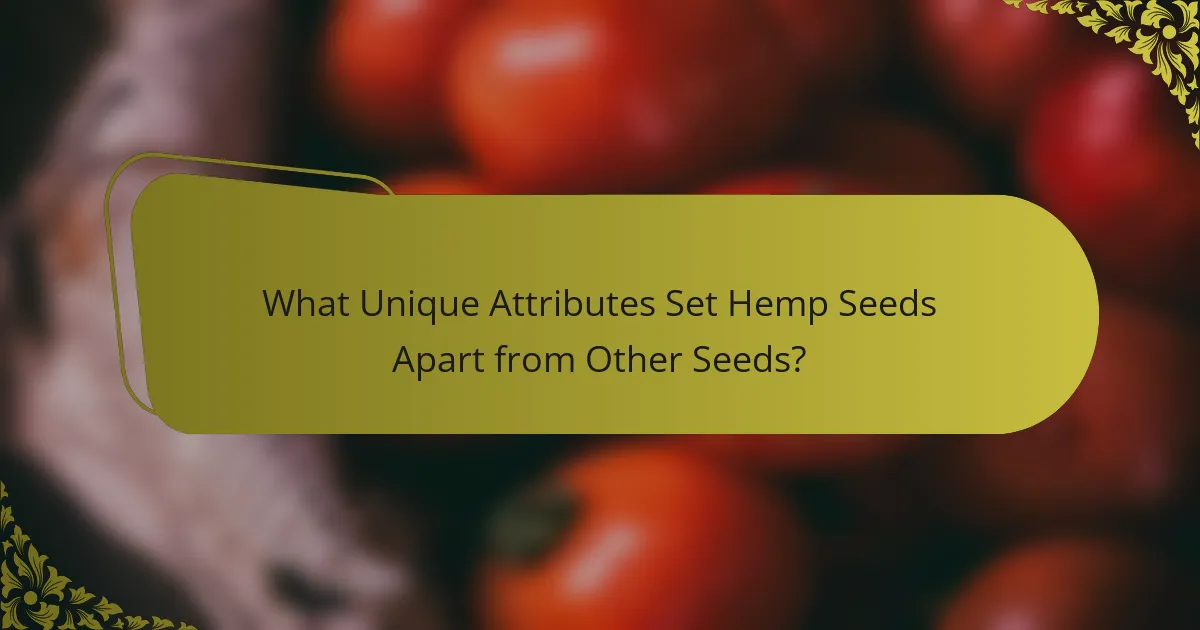
What Unique Attributes Set Hemp Seeds Apart from Other Seeds?
Hemp seeds stand out due to their unique nutrient profile, including high levels of essential fatty acids and protein. They contain all nine essential amino acids, making them a complete protein source. Additionally, hemp seeds are rich in gamma-linolenic acid (GLA), a rare fatty acid that supports hormone balance. Their unique nutty flavour and versatility in recipes further differentiate them from other seeds, allowing for various culinary uses.
How Do the Protein Levels in Hemp Seeds Compare to Other Seeds?
Hemp seeds contain higher protein levels compared to many other seeds. They provide approximately 25 grams of protein per 100 grams, making them a complete protein source. In contrast, chia seeds offer about 17 grams, and flaxseeds provide around 18 grams per 100 grams. Hemp seeds are unique due to their ideal balance of essential amino acids, which enhances their nutritional profile. This makes them a valuable addition to vegetarian and vegan diets.
What Makes the Fibre Content of Hemp Seeds Unique?
Hemp seeds have a unique fibre content that provides both soluble and insoluble fibres. The soluble fibre aids in digestion and helps regulate blood sugar levels, while the insoluble fibre supports gut health and promotes regularity. This dual fibre profile sets hemp seeds apart from many other seeds and nuts, enhancing their nutritional value. Additionally, hemp seeds contain about 8 grams of fibre per 100 grams, contributing to a balanced diet.
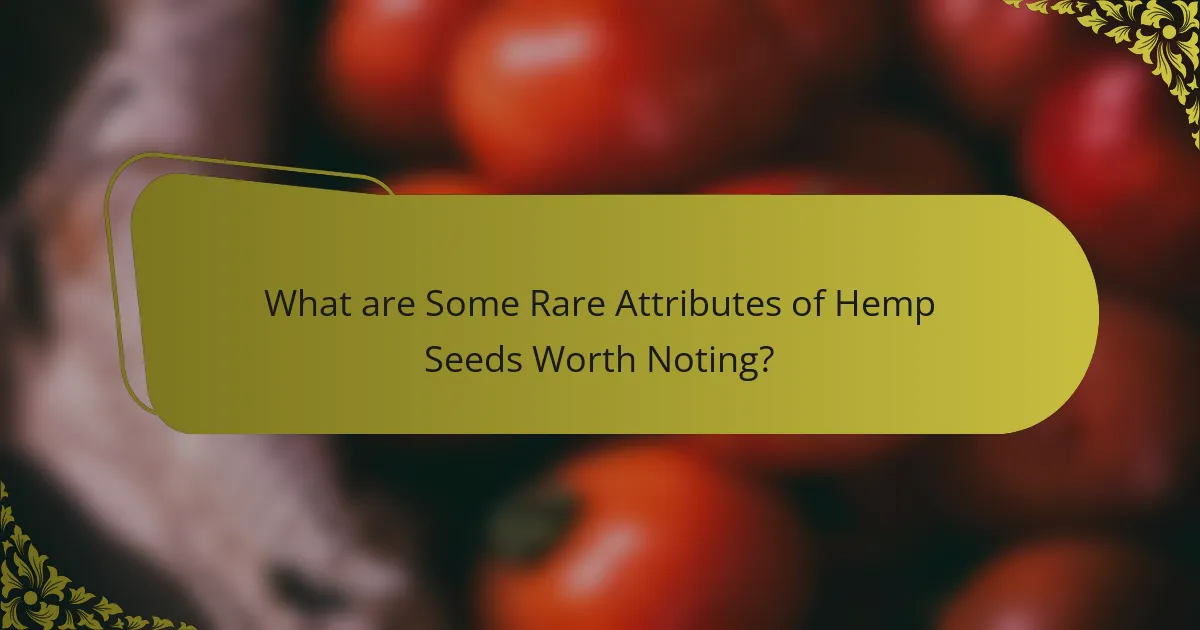
What are Some Rare Attributes of Hemp Seeds Worth Noting?
Hemp seeds possess several rare attributes that enhance their nutritional profile. One notable trait is their unique amino acid composition, containing all nine essential amino acids. Additionally, they are a rich source of gamma-linolenic acid (GLA), which is uncommon in most plant-based foods. Another rare attribute is their ability to provide a significant amount of vitamin E, an antioxidant that supports skin health and immune function. Lastly, hemp seeds contain edestin, a protein that is highly digestible and beneficial for overall health.
How Can Hemp Seeds Contribute to Sustainable Agriculture?
Hemp seeds contribute to sustainable agriculture by enriching soil health and promoting biodiversity. They improve soil structure through deep rooting, which prevents erosion and enhances water retention. Additionally, hemp’s rapid growth suppresses weeds, reducing the need for chemical herbicides.
Hemp seeds are highly nutritious, providing essential fatty acids, protein, and fibre. Their cultivation requires minimal pesticides and fertilisers, making them an environmentally friendly crop. As a result, incorporating hemp seeds into agricultural practices supports eco-friendly farming methods.
What Role Do Hemp Seeds Play in Vegan and Plant-Based Diets?
Hemp seeds are a valuable addition to vegan and plant-based diets due to their rich nutritional profile. They provide essential fatty acids, protein, and various vitamins and minerals. Hemp seeds contain approximately 25% protein, making them an excellent plant-based protein source. Their unique attribute includes a perfect balance of omega-3 and omega-6 fatty acids, supporting heart health. Additionally, they can be easily incorporated into smoothies, salads, and baked goods, enhancing both nutrition and flavour.
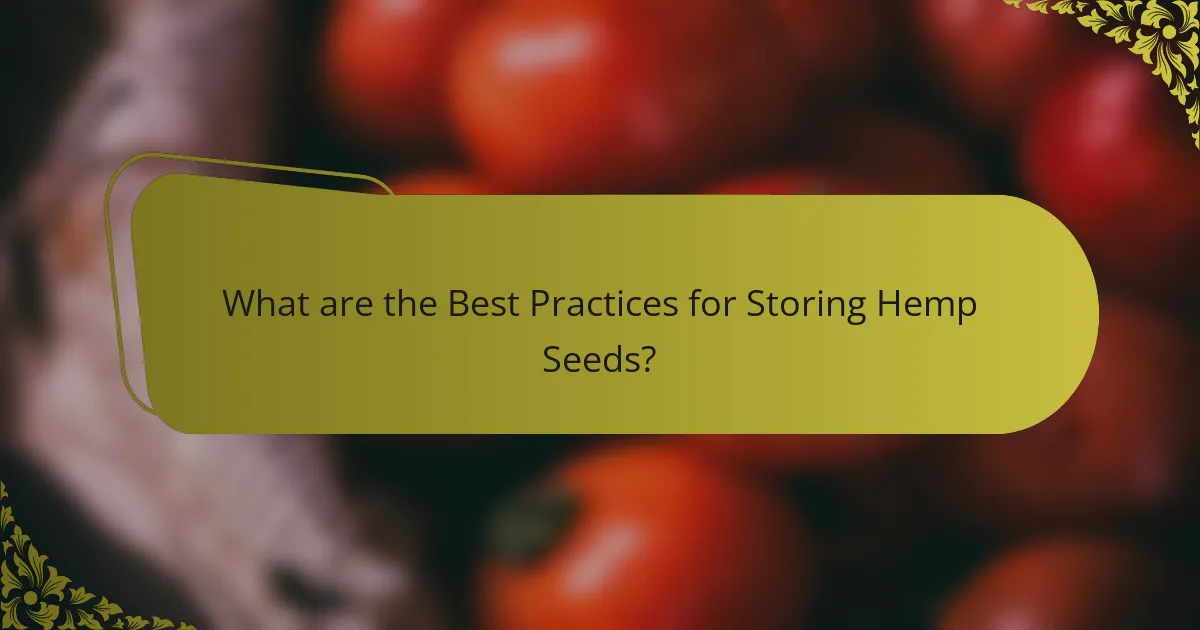
What are the Best Practices for Storing Hemp Seeds?
Store hemp seeds in a cool, dark, and dry place to maintain freshness. Use airtight containers to prevent exposure to moisture and light. Refrigeration can extend their shelf life, ideally up to one year. Avoid storing near strong odours, as hemp seeds can absorb them.
How to Preserve the Freshness of Hemp Seeds?
To preserve the freshness of hemp seeds, store them in a cool, dark place in an airtight container. This protects them from light, moisture, and air exposure, which can lead to rancidity. Refrigeration can extend their shelf life to several months. Additionally, consider buying smaller quantities to ensure you use them before they lose freshness.
What Common Mistakes Should Be Avoided When Using Hemp Seeds?
To avoid common mistakes when using hemp seeds, focus on proper storage, appropriate serving sizes, and ingredient compatibility.
Storing hemp seeds in a cool, dark place prevents rancidity. Using excessive amounts can lead to digestive issues due to high fibre content. Additionally, pairing hemp seeds with incompatible flavours may diminish their nutritional benefits.
